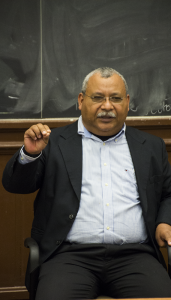
A panel discussed the martyrdom of six Jesuits.
A panel moderated by Fr. Matthew Carnes, S.J., discussed issues surrounding violence in El Salvador in an event sponsored by the Office of Campus Ministry in Healy Hall on Thursday evening, as part of a series of programs commemorating the 25th anniversary of the murders of six Jesuits in El Salvador.
The panel included Rev. Ismael Moreno Coto, S.J., a human rights activist in Honduras, National Advocacy Office of the U.S. Jesuit Conference Policy Director Shaina Aberand and Georgetown Global Politics and Security Chair Mark Lagon.
The panelists referred to the deaths of the Salvadoran Martyrs to frame their discussion of current violence in El Salvador. The murders were perpetrated by the El Salvadoran military at the Jesuits’ residence on the campus of the Jose Simeon Cañas Central American University.
“This is a region that is the size of Oregon,” Aber said. “You can imagine how violence and a coup that destabilizes one country can have a profound impact on the other nations as well.”
Aber also discussed the increasing rates of murder and sexual assault in the region, noting that all three countries experienced more than a 200 percent increase in murder rates since 2005. She stressed that children are also major victims of violence.
“[There are] vigilante death squads that go into communities that are known to be sites of gang activity and just pick off children because youth are admitted into gangs, youth are thought to be the problem,” Aber said.
Lagon attributed this increase in violence to greater levels of human trafficking and displaced people. He blamed this increased violence on the inaction of the El Salvadoran government towards gangs and the corruption of the local police over the past decade.
“The way in which the poor in many countries are unable to thrive because of their lack of access to justice,” Lagon said. “They have rights that exist on paper, laws, or treaties that their countries have ratified, but in truth, people don’t have land rights … and no confidence that law enforcement will protect them.”
Coto, who personally knew the murdered, tied the violence in Honduras today to the brutal massacre 25 years ago.
“Those assassinations 25 years ago stood out because they were irrational and brutal,” Coto said. “Now, if you look at the violence inside Honduras, it is increasingly brutal and increasingly violent and irrational in a way that is somewhat similar.”
Carnes noted the importance of the discussion and how the situation of violence in El Salvador has not improved in recent years.
“We spoke in a powerful way in underlying questions of justice, of dignity, which arise over and over again,” Carnessaid. “I’m struck by [how] we began and continued with and ended with destroyed bodies.”
After the panel concluded, a memorial mass was held to commemorate the Salvadoran Martyrs in Dahlgren Chapel. The rose garden of the chapel was blessed afterwards.
Will Rogers (COL ’18) said that it was important for a serious dialogue to be held on the issue.
“It was insightful. …What [Aber] had to say, was the most acute for me,” Rogers said. “The more you understand about different events in the world, you get a better picture of everything.”














